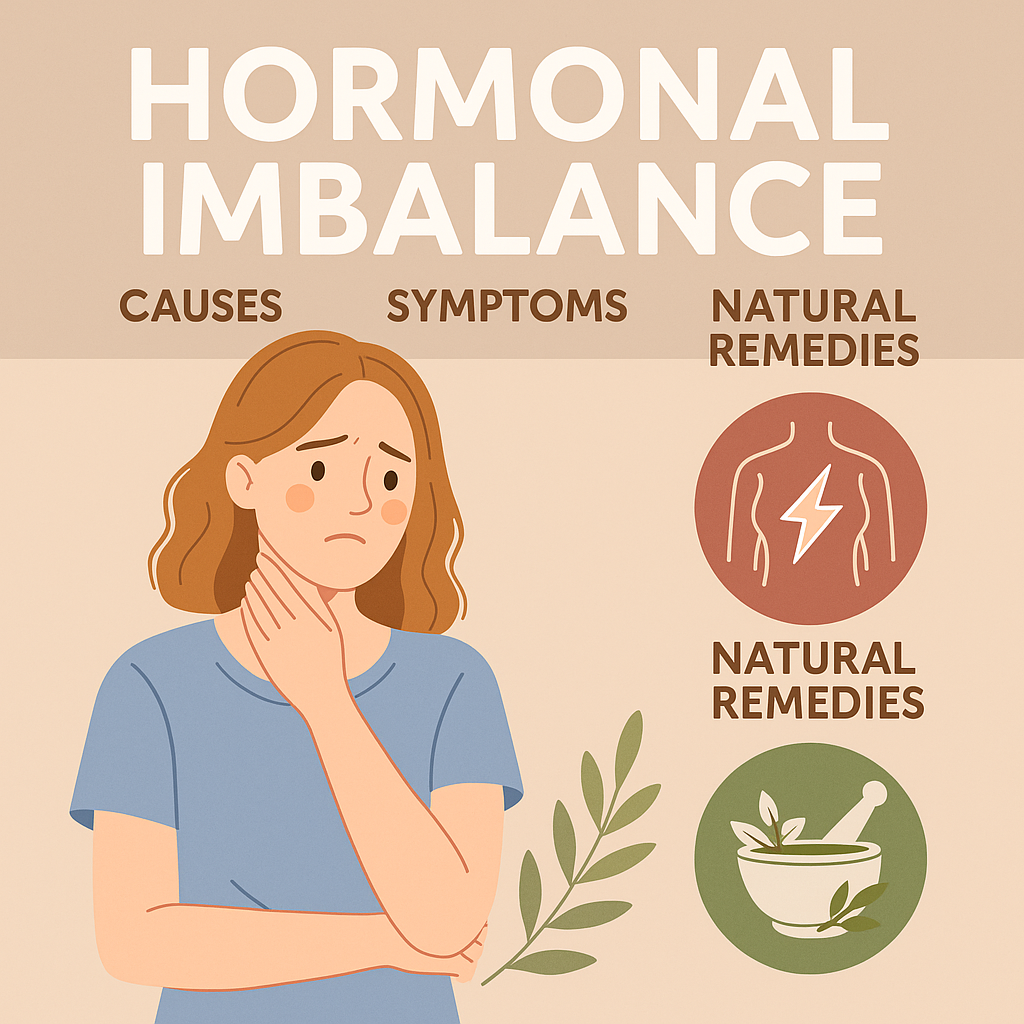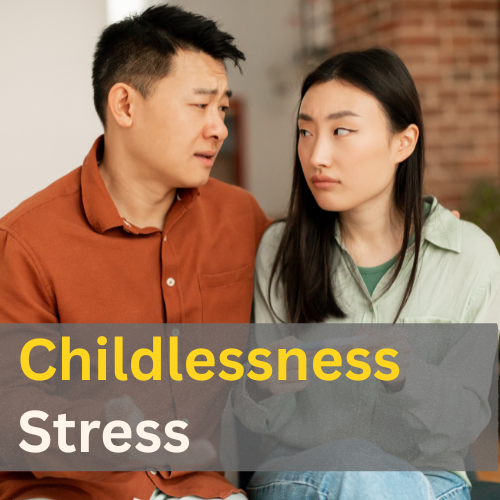Table of Contents
Introduction
Hormonal imbalance is a common yet often misunderstood health issue affecting millions of people worldwide. Whether it’s irregular periods, weight fluctuations, fatigue, or mood swings, the impact of hormonal imbalances can significantly disrupt daily life. While many people immediately associate hormonal imbalances with conditions like Polycystic Ovary Syndrome (PCOS), thyroid disorders, or stress, the causes of hormonal imbalance can be varied, often going unnoticed until the symptoms become severe.
In this post, we’ll take a comprehensive look at hormonal imbalances, their causes, and symptoms, and explore effective, natural ways to restore balance. If you’re dealing with PCOS, thyroid issues, or simply suspect that your hormones may be out of balance, understanding the underlying causes and symptoms is the first step toward improving your health.
By making positive lifestyle changes, managing stress, and supporting your body with proper nutrition and targeted supplements, you can restore your hormones to a balanced state. Let’s dive into the science behind hormonal imbalance and uncover natural steps you can take to regain control of your health.
What Is Hormonal Imbalance?
Hormonal imbalance refers to a condition where the levels of one or more hormones in the body are either too high or too low. Hormones are chemical messengers produced by various glands in the body, including the thyroid, ovaries, adrenal glands, and pituitary gland. These hormones regulate essential processes such as metabolism, reproductive health, mood, growth, and stress response. When hormones become imbalanced, the body’s normal functioning can be disrupted, leading to a range of health issues.
While hormonal imbalances can affect anyone, they are particularly common in women, due to hormonal fluctuations associated with menstruation, pregnancy, menopause, and conditions like PCOS. Hormonal imbalances can also arise due to lifestyle factors such as stress, diet, sleep patterns, and environmental toxins.
Some of the most common conditions related to hormonal imbalance include PCOS, thyroid disorders (both hypothyroidism and hyperthyroidism), and adrenal fatigue. These imbalances often go unnoticed until symptoms start to become more severe, which is why understanding hormonal imbalance and recognizing its symptoms early is crucial to restoring balance and improving overall well-being.
For further information on how to manage hormonal imbalances naturally, visit this Healthline article on Hormonal Health.
The Role of Hormones in the Body
Hormones are vital for regulating many bodily functions. They control processes that are fundamental to both our physical and emotional health. The balance of these hormones is crucial for overall well-being. Let’s explore the roles of some of the most important hormones:
Metabolism and Energy Regulation
Hormones like insulin and cortisol regulate the body’s energy balance and metabolism. Insulin, produced by the pancreas, helps regulate blood sugar levels and allows cells to absorb glucose for energy. When insulin levels become imbalanced, it can lead to issues like weight gain, insulin resistance, and an increased risk of developing Type 2 diabetes. Cortisol, known as the stress hormone, plays a role in regulating the body’s stress response and energy levels.
Reproductive Health
Hormones like estrogen, progesterone, and testosterone regulate menstrual cycles, fertility, and sexual health. Estrogen is primarily responsible for the development of female sexual characteristics and the regulation of the menstrual cycle. Progesterone helps maintain pregnancy and regulate menstruation. Testosterone, although often considered a male hormone, is also vital for women, affecting libido, bone density, and muscle mass.
Mood and Emotions
Hormones like serotonin, dopamine, and cortisol influence mood, stress levels, and emotional health. Imbalances in serotonin and dopamine are often linked to conditions like depression and anxiety. Cortisol, which is released during stress, can lead to feelings of irritability and emotional instability when its levels are elevated for prolonged periods.
Growth and Development
Growth hormone (GH), secreted by the pituitary gland, plays a critical role in physical growth during childhood and adolescence. It also contributes to muscle growth, fat metabolism, and overall well-being in adults. Imbalances in growth hormone levels can affect physical development and overall vitality.
When these hormones are out of balance, the body’s processes become disrupted, leading to symptoms like irregular periods, unexplained weight changes, mood swings, fatigue, and more. Understanding how hormones function is key to identifying and correcting imbalances.
For an in-depth look at how hormones regulate your body, check out this Mayo Clinic article on Hormonal Balance.
Common Causes of Hormonal Imbalance
Hormonal imbalances can occur due to several factors, some of which are physiological, while others are lifestyle-related. Let’s examine the most common causes:
Polycystic Ovary Syndrome (PCOS)
PCOS is one of the leading causes of hormonal imbalance in women. It is characterized by the formation of cysts on the ovaries and an imbalance in reproductive hormones, particularly androgens (male hormones). Elevated androgens can disrupt normal ovulation, leading to irregular periods, weight gain, acne, and excess facial hair growth.
The exact cause of PCOS remains unclear, but it is thought to be linked to insulin resistance and low-grade inflammation. Women with PCOS may also have difficulty conceiving due to these hormonal disruptions. It is essential to diagnose and manage PCOS early to prevent complications such as infertility, metabolic syndrome, and cardiovascular disease.
For more information on PCOS and its treatment options, visit the Healthline PCOS Guide.
Thyroid Disorders
The thyroid is a butterfly-shaped gland located in the neck that produces hormones responsible for regulating metabolism. Hypothyroidism (underactive thyroid) and hyperthyroidism (overactive thyroid) are common thyroid disorders that lead to significant hormonal imbalances.
- Hypothyroidism: When the thyroid produces insufficient hormones, it can result in weight gain, fatigue, dry skin, depression, and cold sensitivity. It can slow down metabolism and cause a general feeling of sluggishness.
- Hyperthyroidism: This condition occurs when the thyroid produces too much hormone, leading to symptoms like weight loss, anxiety, rapid heartbeat, and irritability. An overactive thyroid increases metabolism and can make you feel jittery or restless.
Thyroid disorders are diagnosed through blood tests that measure levels of thyroid hormones like TSH (Thyroid Stimulating Hormone), T3, and T4. For more detailed information, refer to WebMD’s Thyroid Health.
Stress and Cortisol Imbalance
Stress is a significant contributor to hormonal imbalance, particularly through the release of cortisol. Cortisol is the body’s “stress hormone,” which is released in response to physical or emotional stressors. In the short term, cortisol is essential for the body’s fight-or-flight response, but when stress is prolonged, cortisol levels remain elevated, causing disruptions in other hormone systems, such as insulin, estrogen, and testosterone.
Chronic stress can result in adrenal fatigue, where the adrenal glands become depleted from the constant demand for cortisol production. Symptoms of adrenal fatigue include fatigue, weight gain, difficulty sleeping, and poor concentration. Managing stress is crucial to restoring hormonal balance and reducing cortisol’s disruptive effects on the body.
Poor Diet and Lifestyle Factors
Diet and lifestyle choices have a profound impact on hormonal health. A diet rich in processed foods, sugars, and unhealthy fats can increase inflammation, disrupt insulin function, and lead to hormonal imbalances. For example, consuming too much sugar can cause insulin resistance, which affects hormones like estrogen and progesterone.
Additionally, inadequate sleep, lack of exercise, and excessive alcohol consumption can all contribute to hormonal disruptions. Poor sleep patterns can interfere with the production of cortisol, growth hormone, and other vital hormones, while lack of exercise contributes to insulin resistance and poor metabolic function.
For more insights into how lifestyle factors affect your hormonal health, visit The American Heart Association’s tips on a heart-healthy diet.
Symptoms of Hormonal Imbalance
Hormonal imbalances can manifest in a wide variety of symptoms, depending on which hormones are out of balance. While the symptoms can vary, some common signs of hormonal imbalance include:
Irregular Periods
One of the most obvious signs of hormonal imbalance, especially in women, is irregular periods. Hormones like estrogen and progesterone regulate the menstrual cycle, and imbalances in these hormones can lead to missed periods, heavy bleeding, or irregular cycles. Conditions like PCOS, thyroid issues, and stress can disrupt menstrual health.
Weight Fluctuations
Hormonal imbalances, particularly those related to thyroid and insulin hormones, can cause unexplained weight changes. For instance, hypothyroidism leads to weight gain due to a slowed metabolism, while hyperthyroidism causes weight loss due to an accelerated metabolism. Elevated cortisol levels from chronic stress can also contribute to fat accumulation, especially around the abdominal area.
Mood Swings and Anxiety
Hormonal fluctuations have a profound impact on mood regulation. Imbalances in serotonin, dopamine, and cortisol can lead to symptoms of anxiety, depression, irritability, and mood swings. Women with conditions like PCOS or those going through menopause may experience heightened emotional sensitivity due to hormonal changes. Recognizing the connection between mood and hormones is important for addressing emotional health.
Skin Issues
Hormonal imbalances can lead to various skin issues, including acne, oily skin, and dry patches. High levels of androgens (male hormones) from conditions like PCOS can lead to increased oil production, clogged pores, and breakouts. Additionally, fluctuating estrogen levels can affect skin hydration, leading to dryness or oiliness, and contributing to skin aging.
How to Fix Hormonal Imbalance Naturally
While medical intervention may be necessary for some cases of hormonal imbalance, many people can restore balance naturally through diet, exercise, stress management, and lifestyle changes. Here are some actionable steps to help you support your hormonal health:
Eating a Balanced, Hormone-Supporting Diet
A nutrient-dense diet is crucial for maintaining hormone balance. Focus on incorporating whole foods that support hormonal health:
- Healthy Fats: Healthy fats from avocados, olive oil, nuts, seeds, and fatty fish like salmon are vital for hormone production and overall health. Omega-3 fatty acids, in particular, are beneficial for reducing inflammation and supporting hormone regulation.
- Fiber: Foods rich in fiber, such as vegetables, fruits, and whole grains, support estrogen regulation and digestive health. Fiber helps the body eliminate excess estrogen, promoting balanced hormone levels.
- Protein: Consuming lean proteins such as chicken, fish, and legumes helps balance insulin and provides the necessary building blocks for muscle repair and growth. Protein is also essential for stabilizing blood sugar levels, which is crucial for hormone regulation.
To learn more about hormone-supporting foods, check out The Hormone Health Network’s nutrition guidelines.
Exercise and Movement
Regular physical activity supports hormone balance by improving insulin sensitivity, reducing stress, and promoting overall health. Aim for a combination of strength training, cardio, and flexibility exercises to support hormonal health. Exercise not only helps regulate insulin but also improves sleep quality and reduces cortisol levels, both of which are important for hormonal stability.
To explore workouts that specifically help balance hormones, visit this Cycle Syncing Workout Guide.
Stress Management
Since chronic stress disrupts hormonal balance, finding effective ways to manage stress is essential. Practices like meditation, yoga, deep breathing exercises, and progressive muscle relaxation can help reduce cortisol levels and restore balance. Regular relaxation techniques not only help reduce stress but also improve emotional resilience.
Conclusion: Regaining Hormonal Balance for Better Health
Hormonal imbalance can be a challenging issue to manage, but by understanding its causes and symptoms, you can take proactive steps to restore balance naturally. Whether through adopting a hormone-friendly diet, exercising regularly, managing stress, or considering natural supplements, there are numerous ways to support your hormonal health and enhance your well-being.
Start by making small, sustainable changes, and remember that balance is key—both in terms of your hormones and your life. Seek guidance from healthcare professionals when needed, and stay informed about natural approaches to optimize your health.
For further reading, check out these resources:
Frequently Asked Questions About Hormonal Imbalance
1. What are the most common signs of hormonal imbalance?
- The most common signs of hormonal imbalance include irregular periods, unexplained weight fluctuations, mood swings, anxiety, fatigue, skin issues like acne, and changes in sleep patterns. If you notice any of these symptoms, it could indicate an underlying hormonal imbalance.
2. What causes hormonal imbalance in women?
- Hormonal imbalances in women can be caused by conditions like PCOS, thyroid disorders (hypothyroidism or hyperthyroidism), stress, poor diet, lack of sleep, and lifestyle factors. Hormonal fluctuations are also common during periods of life like puberty, pregnancy, and menopause.
3. How do I know if my hormones are out of balance?
- Symptoms such as irregular periods, unexplained weight changes, persistent fatigue, mood swings, and skin issues are common signs of hormonal imbalance. Blood tests and consultations with a healthcare provider can confirm whether your hormones are out of balance.
4. Can hormonal imbalance affect fertility?
- Yes, hormonal imbalance, especially conditions like PCOS, can impact fertility. Imbalances in hormones like estrogen, progesterone, and testosterone can disrupt ovulation, making it harder for women to conceive. If you’re having trouble getting pregnant, it’s advisable to consult with a healthcare provider for proper diagnosis and treatment.
5. Can stress cause hormonal imbalance?
- Chronic stress can significantly impact hormone levels, especially cortisol, the stress hormone. Elevated cortisol levels due to stress can disrupt other hormones such as insulin, estrogen, and testosterone. Long-term stress can contribute to conditions like adrenal fatigue, making stress management a key part of maintaining hormonal balance.
6. How can I naturally balance my hormones?
- To naturally balance hormones, focus on eating a nutrient-rich diet, managing stress, getting regular exercise, and ensuring adequate sleep. Foods rich in healthy fats, fiber, and protein, as well as reducing sugar and processed foods, can support hormone production and regulation. Stress management practices such as yoga, meditation, and relaxation techniques are also beneficial.
7. How do thyroid disorders affect hormonal balance?
- Thyroid disorders, such as hypothyroidism (underactive thyroid) and hyperthyroidism (overactive thyroid), can significantly affect hormonal balance. An underactive thyroid can cause fatigue, weight gain, and depression, while an overactive thyroid may lead to weight loss, anxiety, and rapid heartbeat. Thyroid function can be assessed with blood tests, and treatment typically involves medication to regulate thyroid hormone levels.
8. Is there a connection between hormonal imbalance and weight gain?
- Yes, hormonal imbalances, particularly involving thyroid hormones and insulin, can lead to weight gain. For example, hypothyroidism can slow down metabolism, leading to weight gain, while excess cortisol from chronic stress can lead to fat accumulation, especially around the abdominal area.
9. Can a poor diet lead to hormonal imbalance?
- A diet high in processed foods, sugar, and unhealthy fats can contribute to hormonal imbalances. These foods can increase inflammation, disrupt insulin function, and elevate cortisol levels. A nutrient-dense diet, including healthy fats, fiber, and lean proteins, is essential for maintaining hormonal health.
10. Should I see a doctor if I suspect a hormonal imbalance?
- Yes, if you suspect a hormonal imbalance, it’s important to consult with a healthcare provider. A doctor can perform blood tests to check your hormone levels and diagnose any underlying conditions. Early diagnosis and treatment can prevent further complications and help restore hormonal balance.



Pingback: Mental Health in Women: Understanding Anxiety & Depression
Pingback: PCOS: Understanding Symptoms and Effective Treatments